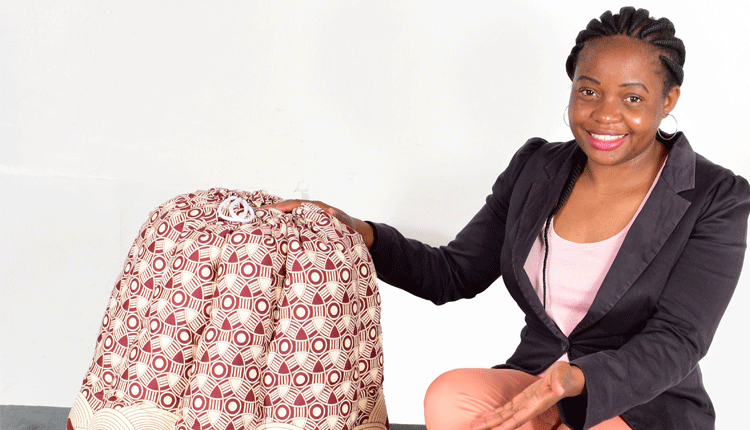I made the bag that cooks – portable fireless cookers

Have you ever thought of boiling your cereals or rice in a fireless cooker bag? Sounds absurd, but thanks to innovation, it is being done.
Ursula Naswa Wanjala, 33, started Tupike, a business venture where she makes portable fireless cookers called Tupike bag.
“Tupike bag is an insulated portable bag that uses heat retention to cook and keep food hot for up to five hours. After five hours have elapsed, the food will keep warm up to eight hours.
I set up Tupike, which means ‘let us cook’ in Kiswahili last year in February and since then every single day has been a learning process for us,” says Ursula.
Born and raised in Bungoma county, Ursula is the last born child of Michael and Daria Wanjala.
“My parents are retired teachers. I am the ninth born in our family. Growing up, almost all my siblings had left home. Some had gotten married and others were in college.
I joined school at a very young age. My mother used to go with me to school and she would let me sit in the nursery class as she attends to her lessons.
She was surprised to be told at the end of the year that I was joining Class One! She didn’t know I was learning with other kids,” she explains.
She studied at Mukhuma Primary School then joined Kabula High School.
“I did my bachelors degree in Business Management at Masinde Muliro University of Science and Technology. In my third year, I specialised in Marketing,” she says.
After her graduation, Ursula got a job at a bank and later on moved to an audit firm.
Fireless cooker
“I didn’t gain job satisfaction in both jobs. I always felt there is a creative side of me I wanted to explore. I left employment and ventured into business.
My sister, Bernadette, gave me capital, which I used to buy a sewing machine, and that’s how my creative side was borne,” she says.
Ursula says she had always wanted to set up a business that will not only bring profits but also contribute to the welfare of the community.
“Growing up, my mum had the traditional fireless cooker made from a basket.
Every time dad was to come home late, she would store his food in it and the food would still be hot by the time he arrived.
The fireless cooker was also used to boil githeri when we went to the farm. This saved us a lot of firewood.
It also meant I could spend less time in the smoke filled kitchen! One day when I visited home, I watched mum use it and I thought: what if I made something similar, but more efficient and portable?” she explains.
She started out by researching on suitable materials that she could use to make the bag and more efficient insulating materials.
“After finding the suitable materials, I shared the idea with my husband and he agreed I should implement the idea.
He provided me with the necessary capital and I began creating a prototype. It was a tedious process because I had to create the product and use it to see if it works.
I failed several times, but in the end I succeeded. Using my expertise in marketing, I embarked on marketing the product on social media, to my friends and family,” she says.
The food is kept in the bag immediately it’s removed from the fire to keep it hot. It can be kept either in a tin or in a cooking pot.
To cook, the food is pre-boiled for several minutes; the cooking pot is tightly covered with a lid and placed in the bag.
The bag is first lined with an aluminium foil at the bottom to prevent it from getting burnt. It will then use the retained heat in the food to cook it until it’s ready.
The cooking time depends on type of food, with rice taking the shortest at 45 minutes and githeri the longest time.
Tupike bag is made of cotton, which acts as an insulator. Ursula says her target clients are households keen on fuel consumption.
“Tupike bag saves 70 per cent of fuel used in homes because the food spends only a fraction of the total cooking time on fire. I also target families that go on road trips and picnics.
The bag comes in handy by keeping their food hot for longer hours. Rural households also use tupike bag for cooking to save on firewood,” she says.
For Ursula, running the venture has been challenging, fun and also a learning process.
Saving the environment
She says: “I get to learn on ways to improve on my product as days go by. Sometimes my clients give me useful feedback and tips about the bag. When I made my first bag, the design was different.
I got a client who wanted a taller bag that could fit a 20litre jerrycan. She wanted to store water for her kids to bathe in the morning.
I went back to the drawing board, and that’s how my current design came about. I have also gotten clients who wanted the bag to be custom made in different shapes and be made with different fabric.
My family has been my greatest support system in running my business. My husband supports me fully and always provides his insights and advice whenever they are needed.”
The Covid-19 pandemic struck just a month after she had set up Tupike.
“It was a difficult period, but because of the usefulness of the bag, I have managed to stay afloat. During these hard times, everybody is interested in saving the little they have.
Tupike bag saves fuel so households that boil foods such as githeri and cereals frequently have opted to use it,” she says.
The biggest challenge that she has encountered she says is convincing people that a simple bag can cook!
“Most people only know that it keeps food hot. I have faced social media backlash several times, but it doesn’t dim my entrepreneural light.
Luckily I have very loyal clients who keep referring their friends and families to buy the bag. They are my brand ambassadors,” Ursula says.
“My most memorable moment was when my first Tupike bag cooked successfully.
The first meal I cooked using the bag was rice for my son. I was speechless when I opened the bag and found the rice well cooked!”
She is currently in the process of looking for partnerships with organisations that work with rural women to introduce the Tupike bag to them.
“Most rural households use three stone fires to cook. When a household uses Tupike bag to cook, in a year five large trees will be saved from deforestation, less water used during cooking and families will enjoy healthier meals because nutrients are retained in the foods while cooking.
Clean cooking reduces indoor pollution and its associated health problems because of less carbon emissions,” she explains.
Her greatest achievement was when she got a chance to exhibit the Tupike bag at the 2020 cottage industries expo at the Village Market.
For other upcoming entrepreneurs, Ursula says: “First, follow your passion. There are times when the business will be in a difficult position that only your passion for it will keep it going.
If profits reduce and you have no passion, you will end up closing shop. Second is value proposition.
Does your passion provide value? Can people pay for it? If your answer is yes, then you are good to go. Third is consistency.
Consistency in business helps you to establish awareness and build trust with your clients. It builds routine and habits, this in turn aides in your business growth.”












